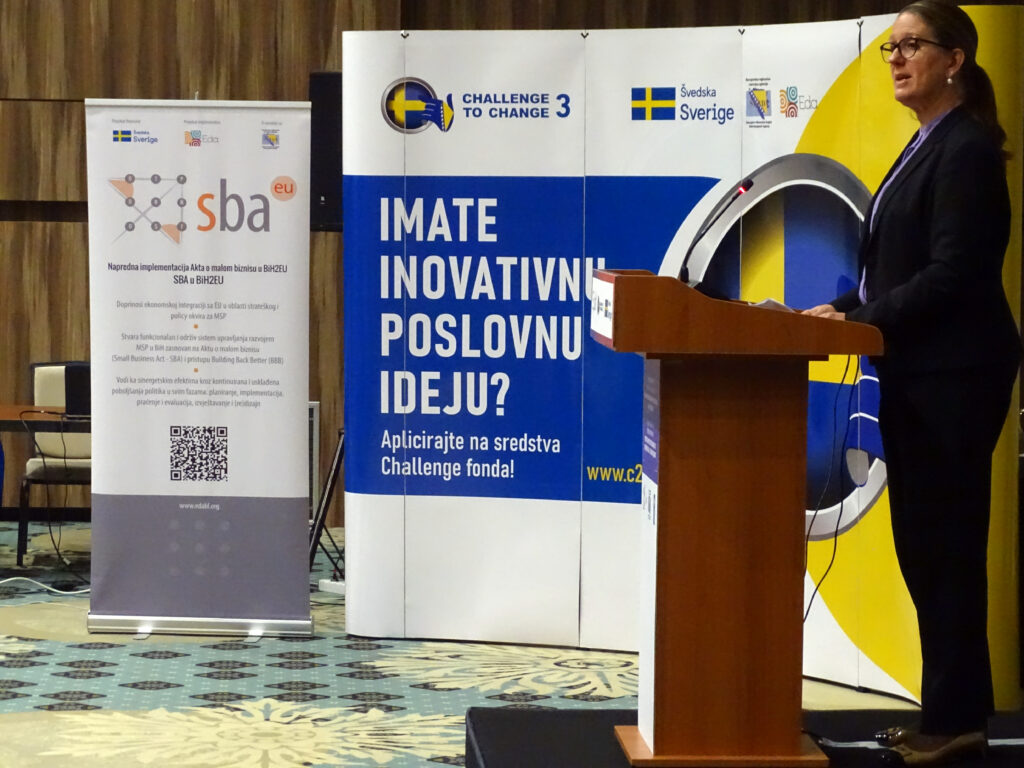The Sixth Annual Conference on SMEs in Bosnia and Herzegovina, held on December 5, 2023, at the Hills Hotel in Sarajevo, with the participation of approximately 100 representatives from businesses, institutions, domestic and international organizations, universities, and donors, yielded several important insights into the need and possibilities for a more effective approach to supporting sustainable SME development. Through joint reflection and discussions, prominent practitioners in the management and implementation of international support projects reached these insights, with excellent moderation and active attention from a large number of interested participants.
At the beginning of the conference, H. E. the Ambassador of Sweden to Bosnia and Herzegovina, Helena Lagerlöf, emphasized the importance of international support for SME development in Bosnia and Herzegovina, highlighting Sweden’s continuous support for the development of SMEs in Bosnia and Herzegovina with the aim of accelerating the integration of the country’s economy into the European Union. The flexible approach in providing assistance by Sweden, based on testing, development, and adaptation of solutions while promoting and taking into account the clear European perspective of Bosnia and Herzegovina, was particularly emphasized. Ambassador Lagerlöf concluded by expressing her belief in strengthening partnerships with local organizations, recognizing and valuing their capacities, knowledge, and experience.
The keynote speaker was Dr. Shawn Cunningham, an international innovation expert from Mesopartner, who expertly summarized and illustratively presented the challenges in creating innovations by companies and the lessons that are difficult to overcome in establishing an appropriate innovation ecosystem.
Jelena Prohaska from Eda presented the preliminary findings of the Sensemaker research on improvements and changes in SMEs. This research represents one of the first implementations of such a study in the country and the first public presentation of ongoing research results.
The theme of the first panel was “(un)learned lessons from project leaders and collaborators,” where experiences were shared by Ismar Ćeremida (UNDP), Donald Prohaska (GIZ), Goran Janković (EDA), and Ognjenka Lalović (VTK BiH). The focus of the discussions was on the limitations of the dominant project approach with predefined goals, indicators, activities, and resources, leading to fragmented and temporary effects insufficient for systemic and dynamic changes necessary for sustainable SME development. The need for and possibilities of a more flexible approach to project design and implementation were highlighted, with a transition from projects to programs with international coordination and the announced shift to a portfolio approach by UNDP. Key words from the first panel included good problem identification and its interdependence, project flexibility, transition to an approach more adapted to the complexity of situations and dynamics of changes, and networking among SMEs and support institutions as a new challenge.
The second panel discussed what needs to change to achieve a greater impact of project support on green and digital transition and innovation in SMEs. Participants included Marina Dimova (UNDP), Mirza Kušljugić (ReSET), Željko Karanović (project manager of the completed project “Market Makers”), Zihnija Hasović (former project manager of the ASB project, EBRD), moderated by Zdravko Miovčić (Eda). Panel participants shared important insights and recommendations, emphasizing a greater focus on creating better jobs and strengthening the so-called meso space, flexibility in project planning and management, with the challenges of more active involvement of SME leaders, characteristics of successful support projects, and weaknesses in the international and domestic support framework (for energy transition). The reasons for the UNDP’s change in approach and the characteristics of the new portfolio approach were also discussed.
In the final part of the conference, Sanela Dževlan (SERDA) spoke about the C2C 3.0 project as a support instrument for innovative SMEs, followed by the awarding of certificates to 38 companies supported within this project.
The Sixth Annual Conference fully met the participants’ expectations, providing an opportunity to collectively review current practices and instruments supporting sustainable SME development in Bosnia and Herzegovina by international projects and donors in a short period and in one place. It also facilitated the common opening and initiation of a new perspective that would more fully take into account the complexity and specificities of the context and enterprises where changes are taking place.
The conference on the topic “Project Support for Sustainable SME Development in Bosnia and Herzegovina – Lessons (Not)Learnt ” was organized by Eda – Enterprise Development Agency and SERDA – Sarajevo Regional Development Agency, in collaboration with UNDP Bosnia and Herzegovina, with the support of the Embassy of Sweden in Bosnia and Herzegovina through the projects “Advanced Implementation of the Small Business Act in BiH2EU – SBA in BiH2EU” and “Challenge to Change, C2C 3.0.”

















